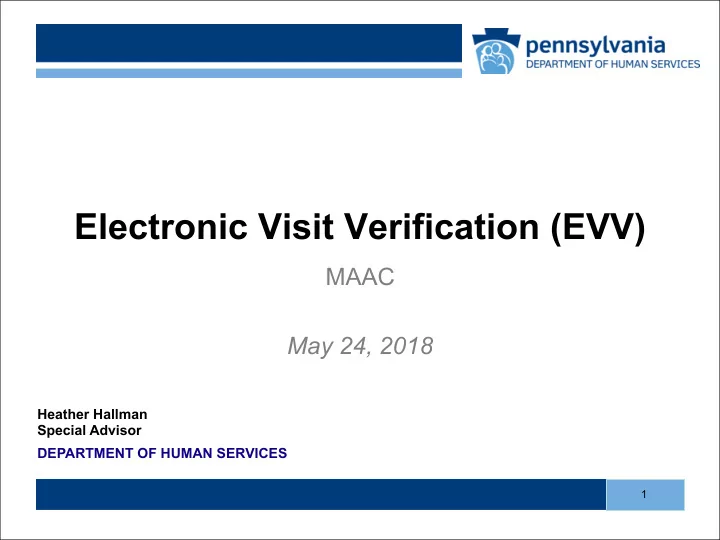

Electronic Visit Verification (EVV) MAAC May 24, 2018 Heather Hallman Special Advisor DEPARTMENT OF HUMAN SERVICES 1
The 21 st Century Cures Act The federal 21 st Century Cures Act was signed into law on • December 13, 2016. • Section 12006 of the Act requires all states to implement the use of EVV for Medicaid-funded personal care and home health care services. • The Cures Act (Section 12006(a)(1)(A)) requires that states that do not comply with the Cures Act by the applicable deadlines will have their Federal Medical Assistance Percentage (FMAP) reduced. – EVV must be implemented for personal care services by January 1, 2019. – EVV must be implemented for home health services by January 1, 2023. 2 5/24/18
EVV Requirements EVV is a system that electronically verifies the delivery of personal care and home health care services. The Cures Act requires that the system verify: • Type of service provided, • Individual receiving the service, • Individual providing the service, • Date of the service, • Location of the service delivery, and • Time the service begins and ends. 3 5/24/18
EVV Devices Services may be verified by: • The recipient’s home landline telephone, • Smart phone, • Biometric recognition systems, • Or fixed visit verification device- an electronic random numbers device in the beneficiary’s home. 4 5/24/18
Impacted Programs EVV will be required for personal care and home health care services provided in the following Medical Assistance programs: • Adult Autism Waiver Program • Aging Waiver Program • Attendant Care Waiver Program • Community HealthChoices Program • Community Living Waiver Program • Consolidated Waiver Program • Fee-For-Service • HealthChoices Program - Physical and Behavioral Health • Independence Waiver Program • OBRA Waiver Program • Person/Family Directed Support Waiver Program 5 5/24/18
What is Considered PCS? • The Centers for Medicare & Medicaid Services (CMS) states that PCS consists of services supporting activities of daily living (ADL), such as movement, bathing, toileting, transferring, and personal hygiene or offers support for instrumental activities of daily living (IADL), such as meal preparation, money management, shopping, and telephone use. • CMS interprets the reference in the statute to an “in- home visit” to exclude PCS provided in congregate residential settings where 24 hour service is available. • Additional guidance from CMS was recently provided. 6 5/24/18
What services are under PCS? OLTL Waivers (Includes Agency and Participant-Directed Services) • Personal Assistance Services • Respite (unlicensed settings only) ID/A Waivers (Includes Agency and Participant-Directed Services) • Companion • In-Home and Community Support • Respite (unlicensed settings only) • Homemaker/Chore (chore portion not included) AAW • Community Support • Respite (unlicensed settings only) 7 5/24/18
Stakeholder Input • The Department solicited input from beneficiaries, family caregivers, provider agencies and individuals who furnish PCS or home health care services, managed care organizations (MCOs), and other stakeholders on the current use of EVV in the Commonwealth and the impact of EVV implementation. • The Department asked for feedback on existing best practices; EVV systems currently in use in Pennsylvania; and preference for a state, state- contracted, or provider agency-operated EVV system. 8 5/24/18
Stakeholder Input • The most common points raised by respondents included: – Individuals will receive the care they need more efficiently through an open system that allows care providers the flexibility to choose the system that works best for them. – A closed system restricts providers, forcing some of them to rework a significant portion of their method of care. – Flexibility will be needed if a closed system is chosen. – Continued stakeholder feedback is essential. – A state system could be adopted for agencies not currently utilizing EVV. – An open system stimulates competition among EVV vendors. 9 5/24/18
Pennsylvania’s Plan To comply with the EVV requirement, DHS will use a two-phased approach. Short Term: DHS will use the existing PROMISe fiscal agent contract with DXC to comply with the federal requirement for EVV by January 1, 2019. This will be an open system that will receive information from existing EVV systems being used by providers and will provide EVV for PCS providers who do not have their own system. Long Term: DHS wants to have a better understanding of what providers are currently using for EVV and which providers do not currently use EVV. DHS issued a survey to providers to collect this additional information. DHS also recently released a Request for Information (RFI) directed at EVV vendors. This provider survey and the RFI will give DHS an understanding of the full capabilities of EVV systems and the needs of providers. This information will inform DHS’s next steps with the possibility of a future procurement. 10 5/24/18
Policy Decisions • DHS wants to ensure that participants are able to be out in the community while still complying with the EVV requirements. • Many policy decisions have to be made and we want your input: – Should there be a grace period? How long? – How should we define compliance? • Percentage of check-ins? • Percentage of check-ins that are clean? – How far from a specified location should be allowed for check- ins? – Who can approve exceptions? 11 5/24/18
Questions Questions regarding EVV can be sent to the EVV resource account at RA-PWEVVNotice@pa.gov. 12 5/24/18
Recommend
More recommend